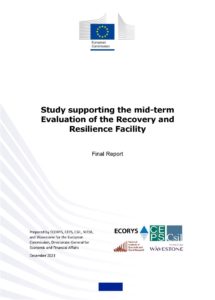
CSIL contributed to the “Study Supporting the Mid-term Evaluation of the Recovery and Resilience Facility,” conducted with Ecorys, CEPS, NIESR, and Wavestone between March and October 2023. The study, commissioned by the European Commission’s Directorate General Economic and Financial Affairs, aims to provide an objective and independent assessment of the effectiveness, efficiency, relevance, coherence, and EU-added value of the Recovery and Resilience Facility. The supporting study feeds into the EC’s mid-term evaluation report. Moreover, the study also provides useful background evidence and lessons learned for discussions on possible future performance-based instruments in the post-2027 Multiannual Financial Framework (MFF).
To achieve the objectives of the evaluation, various methodologies were employed, including an extensive literature review, the analysis of the RRF scoreboard data, surveys targeting key national stakeholders, targeted interviews, eight case studies focusing on specific policy areas related to the RRF’s pillars and cross-cutting aspects, workshops, analysis of costs and benefits, macroeconomic modelling, and public consultation. CSIL experts have been specifically involved in the surveys, the interviews, the case study on the interaction between EU Cohesion Policy and the RRF, and the analysis of cost and benefits.
The RRF, with its unprecedented financial size and nature, has emerged as a cornerstone for supporting reforms and investments across the 27 Member States. With a significant amount of financial resources (up to €723.8 billion in total), the RRF has provided crucial support to increase resilience in response to the COVID-19 crisis and helped address longstanding challenges hampering growth and socio-economic development.
The performance-based approach is certainly the main innovation of the RRF, together with the large issuance of common EU debt and the focus on a combination of reforms and investments.
As of mid-2023, 31% of the overall amount of planned grants and loans has been disbursed under the RRF. Nevertheless, the pace of financial progress presents a significant risk of delays compared to indicative planning, attributed to various factors, including revisions of plans, difficulties in meeting milestones and targets, changes in government priorities, administrative capacity issues, and external factors such as geopolitical events and economic challenges.
The general conclusion of the study is that the RRF provided a macro-relevant common and synchronised EU response to support Member States’ recovery after the COVID-19 pandemic and the energy crisis. The evaluation findings show that the RRF has triggered the implementation of major and long-awaited reforms across a wide range of policy areas, increased EU GDP, lowered EU unemployment, and helped avoid financial fragmentation. Nevertheless, the risks associated with the implementation of the RRF will need to be closely monitored in the coming years.
For more information, see: